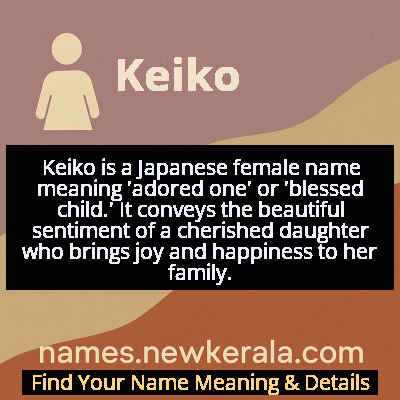Keiko Name Meaning & Details
Origin, Popularity, Numerology Analysis & Name Meaning of Keiko
Discover the origin, meaning, and cultural significance of the name KEIKO. Delve into its historical roots and explore the lasting impact it has had on communities and traditions.
Name
Keiko
Gender
Female
Origin
Japanese
Lucky Number
6
Meaning of the Name - Keiko
Keiko is a Japanese female name meaning 'adored one' or 'blessed child.' It conveys the beautiful sentiment of a cherished daughter who brings joy and happiness to her family.
Keiko - Complete Numerology Analysis
Your Numerology Number
Based on Pythagorean Numerology System
Ruling Planet
Venus
Positive Nature
Harmonious, responsible, caring, and artistic.
Negative Traits
Overly idealistic, superficial, possessive, or jealous.
Lucky Colours
Pink, turquoise.
Lucky Days
Friday.
Lucky Stones
Diamond, turquoise.
Harmony Numbers
2, 3, 9.
Best Suited Professions
Artists, musicians, teachers, healthcare workers.
What People Like About You
Warmth, nurturing nature, artistic flair.
Famous People Named Keiko
Keiko Fukuda
Martial Artist
Highest-ranked female judoka in history, last living student of judo founder Jigoro Kano
Keiko Matsui
Musician
Internationally renowned jazz pianist and composer with over 1.2 million albums sold
Keiko Agena
Actress
Known for playing Lane Kim on the television series Gilmore Girls
Keiko Kitagawa
Actress
Popular Japanese actress known for roles in Sailor Moon live-action and other major films
Name Variations & International Equivalents
Click on blue names to explore their detailed meanings. Gray names with will be available soon.
Cultural & Historical Significance
The name represents the cultural ideal of the cherished daughter who brings joy and blessing to her family, embodying qualities of purity, elegance, and domestic harmony that have been valued in Japanese society for centuries. During Japan's rapid modernization in the 20th century, names like Keiko served as anchors to cultural identity, maintaining connection to traditional values while adapting to contemporary life. The enduring popularity of Keiko across decades demonstrates how certain names become woven into the national consciousness, representing both personal identity and collective cultural memory.
Extended Personality Analysis
Women named Keiko are often perceived as graceful, compassionate, and emotionally intelligent individuals. They typically exhibit a calm demeanor and natural elegance that draws people to them, combined with a strong sense of loyalty to family and friends. Keikos are frequently described as having excellent interpersonal skills, able to navigate social situations with tact and sensitivity while maintaining their authentic selves. Their name meaning 'adored one' often translates into a personality that genuinely cares for others' wellbeing, making them natural caregivers and supportive companions.
Many Keikos display artistic or creative talents, particularly in traditional Japanese arts or music, reflecting the cultural heritage embedded in their name. They tend to be resilient yet gentle, combining inner strength with outward softness in a way that makes them both respected and beloved in their communities. This balance of traditional values with modern adaptability allows Keikos to thrive in various environments while maintaining their core identity. The name's association with being cherished often manifests in individuals who value deep, meaningful relationships and who approach life with a sense of gratitude and appreciation for beauty in all its forms.
Modern Usage & Popularity
In contemporary Japan, Keiko remains a respected and recognizable name, though its popularity has declined among younger generations in favor of more modern naming trends. The name continues to be used by Japanese families who value traditional names with deep cultural roots, particularly those seeking to honor family heritage or convey wishes for their daughter's happiness. Internationally, Keiko has gained recognition through Japanese cultural exports and diaspora communities, often chosen by parents interested in Japanese culture or seeking a name that sounds both exotic and elegant. While not among the top 100 names for newborns in Japan today, Keiko maintains a classic status similar to names like Mary or Elizabeth in Western cultures - timeless, dignified, and carrying generations of cultural meaning. The name's usage has also spread to multicultural families and non-Japanese parents who appreciate its beautiful meaning and melodic sound.
Symbolic & Spiritual Meanings
Symbolically, Keiko represents the cherished child who brings light and joy to her family, embodying the hope and promise of new generations. The name carries connotations of purity, grace, and the blooming of potential, much like a delicate flower carefully nurtured to full beauty. In a broader metaphorical sense, Keiko symbolizes the interconnectedness of tradition and modernity, serving as a bridge between ancestral values and contemporary life. The name evokes images of spring blossoms, representing renewal and the cyclical nature of life, while also suggesting the quiet strength and resilience found in Japanese cultural ideals of feminine virtue. Keiko embodies the concept of 'wa' (harmony) - both internal peace and harmonious relationships with others - making it a name that speaks to balance, beauty, and the profound value of being truly cherished.

